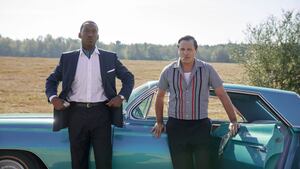Marvel’s Black Panther made history today, scoring the first-ever Best Picture Oscar nomination for a superhero film, one of seven total. And yet, it’s not seen as a real threat for the big prize despite being one of the most successful films ever made and getting better reviews than its fellow contenders like Green Book, Vice and Bohemian Rhapsody.
Meanwhile, the blockbuster film, which was expected to get at least 10 nods, was snubbed in categories like Best Director (for Ryan Coogler), Best Supporting Actor (for Michael B. Jordan), Best Editing, Best Adapted Screenplay and even Best Visual Effects.
How can a film widely hailed as a genre-revitalizing cultural touchstone when it was released last February be an underdog come awards season? Certainly, there’s a precedent for big-budget, audience-pleasing blockbusters winning Best Picture (see: Forrest Gump, Ben-Hur, Titanic).
Some will argue that Black Panther under-performed nominations-wise because it is a superhero film—but it could also be because it dares to be a predominately Black film that doesn’t place racial oppression or white redemption at the center of its narrative.
A cursory look at this year’s nominees suggest a stronger effort at inclusion and diversity. But Green Book, which scored five nods, has been criticized for its handling of the African-American Dr. Don Shirley character, played by Mahershala Ali (as well was for offensive behavior from its director and screenwriter), is a film that takes place comfortably in the past, where audiences can enjoy a safe distance from the bigotry on-screen through a narrative written from the perspective of a white man.
It’s telling that while the film is marketed as a two-hander—Viggo Mortensen is nominated in the lead category, while Mahershala Ali is in the supporting race—the fact that Sam Rockwell (who won last year for Three Billboards Outside Ebbing, Missouri, playing a racist who is somewhat improbably redeemed during the denouement) was nominated for the second year in a row for an above-average George W. Bush impression instead of Michael B. Jordan for his dynamic, buzzworthy performance as the villain Killmonger in Black Panther only adds insult to injury
Even BlacKkKlansman, as entertaining and provocative as it is, still features an audience-friendly white character at the center of its narrative. Ironically, it was Adam Driver that got the nod for playing that role in the movie, instead of its Black leading man John David Washington.
What set Black Panther apart, and made it revolutionary, was its whole-hearted embrace of Afrofuturism. The central conflict of the film revolved around what is the best way to ensure a more egalitarian world for minority populations all over the world, not how a white man can overcome his implicit biases and discover that Black people are people too after all.
And while Black Panther’s very presence in the Oscar race is a testament to its staying power—lest we forget, the Academy briefly floated the widely-panned idea of a ‘Most Popular Film’ category in a naked effort to ghettoize it—the lack of recognition for its versatile director, whose vision made the film so much more than just another comic book adaptation, suggests that it’s not truly been accepted by the Academy as the cinematic work of art it is.
The Academy’s unwillingness to acknowledge the talents of Coogler and Jordan (for their previous acclaimed work on Fruitvale Station and Creed) is one of the most confounding Oscar trends in recent years, which have been tumultuous to say the least.
It’s been 10 years since the awards were guilted into expanding its Best Picture race in an attempt to include more popular fare. Then came the #OscarsSoWhite campaign which led to a real effort on behalf of the Academy (and its first African-American president) to diversify the Oscar voting pool. And there are signs that these efforts have made a difference.
The intersectional Moonlight certainly fits no mold for previous Best Picture winners, and the presence of a genre movie (and a sequel at that) like Mad Max: Fury Road at the Oscars would have been unthinkable a decade ago. And of course, no number of nominations or lack thereof will diminish Black Panther’s popularity or impact.
And yet the Oscars will continue to experience the drama that has come to define the ceremony in recent years. The show is already reeling from controversy over who will or should host. There will be the inevitable reports of dwindling ratings and the show’s overlength and tone-deafness to real-world concerns or tastes.
All of those factors can’t be easily dismissed. It’s become very hip to not like the Oscars, to rag on them, call them irrelevant.
But they matter because they give us insight into how the film industry views itself. Hollywood is still a tastemaker and the films they choose to recognize and reward represent what they consider the best they have to offer or perhaps, what they think is the best representation of themselves.
And despite the industry’s reputation as a liberal bastion, when it comes to race they have always veered toward safe and sanitary stories that present America’s history of race as a story of the eventual triumph of good over evil.
It’s not a coincidence that a more ambiguous take on race like If Beale Street Could Talk didn’t even make it into the Best Picture race at all, while a far worse reviewed and divisive movie like Vice came up big.
This is an industry that is recognizing an iconic director like Spike Lee for the very first time, when his most seminal film, 1989’s Do the Right Thing, wasn’t even nominated for Best Picture. The winner that year was Driving Miss Daisy.
That slight is now widely seen as a historic wrong, but it suggested the industry was only willing to give its blessing to the race-conscious film that made them more comfortable, rather than one that wanted to reckon with our unpredictable present and future.
Black Panther being in the Best Picture race is still undoubtedly a victory for cinephiles of all backgrounds who want to see a more diversified and inspirational version of the Black experience on-screen, but it’s still an incremental one.








